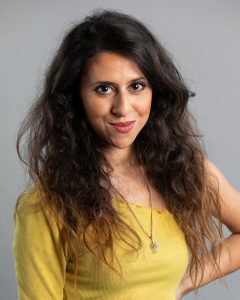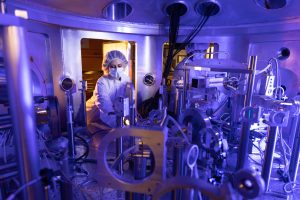This week we talked to Meriame Berboucha, a PhD student in the Plasma Physics group currently based at the SLAC National Accelerator Laboratory in California.
Describe your path into physics, what kickstarted it?
During my A levels I was taken to the Rutherford Appleton Laboratory in Didcot for a medical physics masterclass and I fell in love with the subject – I was interested in helping others and I loved physics and maths and it seemed like the perfect subject for me.

Even though I had written my personal statement for medical school already, I scraped it a few months before the deadline, to apply for physics degrees at university. At the time I felt like I was taking a gamble and my parents wanted me to do medicine, but deep down I really enjoyed physics and that is what I wanted to do. I owe a lot to my physics A level teacher though for really making me feel included in the class and not ‘weird’ for studying the subject. I then became the first woman at that school to take physics onto higher education.
What is the topic of your PhD?
I work in the field of laboratory astrophysics where I recreate the conditions found in space with high power lasers! Specifically, I work on a state of matter known as warm dense matter which lies between condensed matter and plasma. Warm dense matter is found in interiors of planets like Neptune and Uranus but also fusion plasma making it an interesting topic to study. As of now, warm dense matter is not well understood and by doing experiments I hope to add to the body of knowledge of warm dense matter to help theorists come up with a cohesive and complete model of warm dense matter which would also help the fusion community.
How is Imperial involved and what’s it like to be working across the world?
I am a PhD student in the Plasma Physics group at Imperial College London, but I am based at the SLAC National Accelerator Laboratory in California where I carry out all my research. I am part of a research group at Imperial but also at SLAC and being able to have the best of both worlds: a UK-length-PhD and being able to work in a US national lab is such a unique and fulfilling experience. I did an internship at SLAC when I was an undergrad at Imperial, where I was the first international undergrad to intern at the Linac Coherent Light Source. I was amazed by the work that was happening there and I wanted to be a part of it but also remain close to the lovely Imperial community. I then reached out to ask if I could do a hybrid PhD and I am so grateful for this opportunity, I’ve been able to learn a huge breadth of skills between working in a US national lab and a university environment. I also get to interact with non-scientists at SLAC which has enabled me to learn new things from those that are not in my field.
How did you start your science communication journey? What have been the challenges and teachings of this project?

I was the only woman in my physics A Level class and a few teachers and a lot of my classmates told me that ‘you’re smart, you should do medicine’ or ‘isn’t physics a guy subject’. Hearing that whilst trying to hide that I enjoyed physics made me feel like I was strange and I really didn’t feel like I fit in at school because I enjoyed physics. Because of these experiences, I wanted to make physics an accessible subject for all, without judgement, so I started a science club at my secondary school to make science a subject where all felt welcome. From there, I entered the IOP Very Early Career Physics Communicator Competition and was highly commended. I was asked to write a piece for their newsletter and then decided to start a blog because I was inspired by the other competitors. The science blog then began my journey into sci comm, where I started documenting my life as a ‘girl in a physics world’ on Instagram and that’s when I started to develop a following a passion to share science. On top of that, I started the #MinoritySquared movement that gives others the chance to share their stories as a minority in a minority group in STEM. After that I became the host and producer for a science radio show called Science Mixtape on Soho Radio, that gave me visibility to get selected to be a Forbes contributor. Pictures can speak a thousand words so being able to put the face; as a minority in a minority and relate it to the STEM field to help break the stereotypes is something I care about.
During your journey, what has your experience been being a woman in Physics?
I’m very feminine and the main comment I get is that ‘you don’t look like a physicist’ or ‘you’re too glamourous to be a physicist.’ Just because I love makeup, fashion, and painting my nails doesn’t mean that I can’t be a physicist. I’m regularly mistaken for working in HR, or being a secretary, but I AM A PHYSICIST and only last week I was in a shipping center and someone asked me if I was lost… err I work here…
When I first started at Imperial I felt some internal pressure to dress more masculine, and I felt like I was hiding my true self for my entire undergrad, particularly in UROPs at Imperial. I felt like I would only be respected if I dressed in a masculine way. Since my undergrad, I got fed up of hiding my true self and now even if I get comments like ‘where are you going dressed like that?” I remain strong and true to myself because I don’t want to feel like I have to hide who I am and I want others to feel empowered to be their true selves in and outside of the workplace.
What advice would you have for your undergrad/first-year postgrad self?
If you don’t see someone like you in a position you want to be in, BE THAT PERSON! Be a trailblazer and don’t accept no for an answer. Before I did a hybrid Masters and PhD between SLAC and Imperial a lot of people said it would be hard to get the right people to agree with the collaboration but I stuck through it and eventually became the first international undergraduate to intern with the Linac Coherent Light Source at SLAC which then paved the way for other international students to intern there from all over the world. So this is why I say never accept no as an answer but also in my opinion, I really dislike the fact that your passport dictates where you can study or work and in my eyes science is global and works better with collaboration. So, if there’s anything I can do in my power to change that then I will try my best to make the workplace as inclusive as possible.